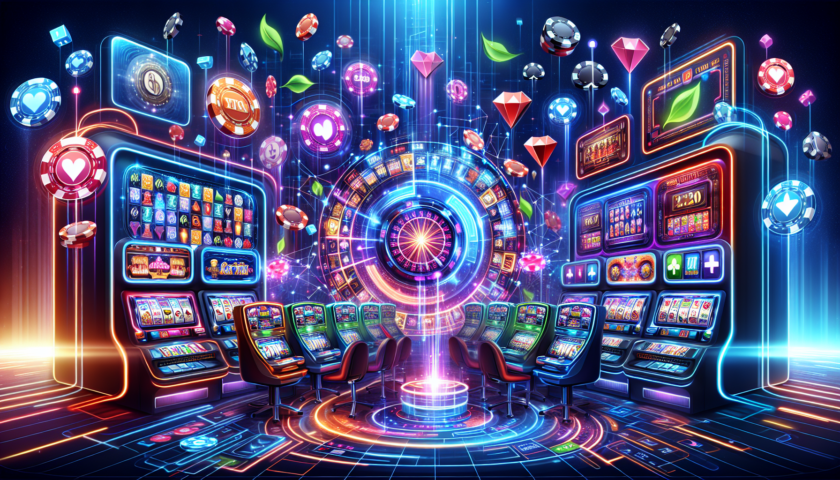
Exploring the Evolution of Online Gaming Platforms: A Glimpse into the Future
Online gaming platforms have undergone a significant transformation in recent years, evolving from basic multiplayer experiences to intricate ecosystems offering immersive worlds, social interaction, and real-time global competitions. What once started as a simple pastime is now a thriving industry, with billions of users engaging across various genres and formats Hoki805. As technology continues to advance, these platforms are becoming more dynamic, innovative, and inclusive, fostering an ever-expanding digital universe. This article delves into the unique aspects of these platforms and examines what the future might hold.
1. From Console to Cloud: The Shift to Accessibility
Historically, online gaming was largely confined to dedicated consoles, gaming PCs, and local networks. However, the rapid rise of cloud gaming has significantly altered this landscape. Platforms like Google Stadia, Xbox Cloud Gaming, and NVIDIA GeForce Now have revolutionized access, allowing players to stream games directly to any device with an internet connection—eliminating the need for expensive hardware. This shift is particularly impactful for users in regions where access to high-end gaming devices is limited, democratizing the experience and fostering a more inclusive gaming environment.
2. The Social Revolution: Gaming as a Social Hub
Modern online gaming platforms are no longer just about playing; they are about connecting. Social interaction has become a core component of the gaming experience, with platforms like Discord, Twitch, and Facebook Gaming enabling players to communicate, share, and engage with each other in real-time. Multiplayer games like Fortnite, PUBG, and Among Us have set the stage for cross-platform play, enabling users from different devices to team up, communicate, and compete. Gaming has become an activity that brings people together, fostering global communities and even real-world friendships.
3. Esports: The Rise of Competitive Gaming
Esports is another significant driver of the evolution of online gaming platforms. What was once a niche interest has exploded into a multibillion-dollar industry, with professional tournaments, sponsorships, and streaming platforms making esports a mainstream phenomenon. Games like League of Legends, Dota 2, and Counter-Strike: Global Offensive have not only set new standards for gameplay complexity but have also made professional gaming a legitimate career option for thousands of players worldwide. Platforms dedicated to esports, such as Twitch and YouTube Gaming, have played an essential role in the growth of this industry by providing a stage for both players and fans.
4. Metaverse Integration: Virtual Worlds Beyond Gaming
The concept of the metaverse is one of the most exciting developments in the online gaming sector. In the near future, many gaming platforms will integrate elements of the metaverse—creating expansive, virtual worlds that blend gaming, social interaction, entertainment, and commerce. Platforms like Roblox and Minecraft are already paving the way for this virtual ecosystem, where users can not only play but also create their own worlds, develop games, and interact with brands in innovative ways. These platforms represent the fusion of gaming with augmented reality (AR), virtual reality (VR), and blockchain technology, potentially transforming how users experience digital environments.
5. NFTs and Blockchain: A New Economic Model for Gamers
Blockchain technology and non-fungible tokens (NFTs) are becoming increasingly intertwined with online gaming platforms. By incorporating NFTs into games, developers can create unique, tradable in-game assets that players can buy, sell, or trade across different platforms. Games like Axie Infinity have demonstrated the potential for blockchain technology to create decentralized economies where players can earn real-world value from in-game activities. While this integration is still in its early stages, it holds the promise of reshaping how value is exchanged in the gaming world, creating a new economy driven by player participation and digital ownership.
6. Artificial Intelligence: Personalized Experiences
The role of artificial intelligence (AI) in online gaming platforms is another area ripe for innovation. AI can be used to create smarter, more responsive NPCs (non-playable characters), dynamic in-game worlds, and even personalized game experiences. AI can also be utilized to improve matchmaking systems, ensuring that players are paired with others of similar skill levels, creating fairer and more enjoyable experiences. Furthermore, AI-driven game development is streamlining the creation of expansive game worlds and complex narratives, allowing for richer and more interactive gameplay.